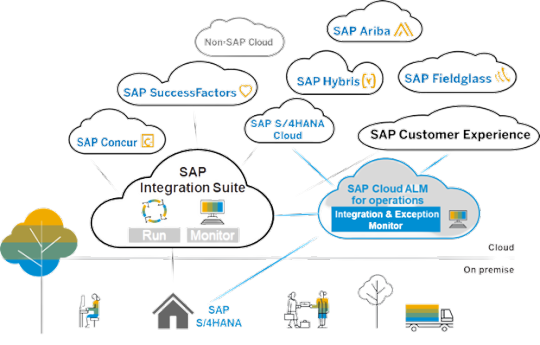#SAP Cloud
Text
youtube
0 notes
Text
C_ABAPD_2309 Certification Exam | Master SAP ABAP Development in 2023
Prepare for the C_ABAPD_2309 certification exam and become a proficient SAP ABAP developer. This exam, tailored for 2023, covers essential topics such as ABAP programming, SAP HANA integration, ABAP dictionary, and advanced development techniques. With a focus on the latest SAP technologies and best practices, passing this exam will validate your ability to design, develop, and optimize applications within the SAP ecosystem. Whether you're an experienced developer looking to update your skills or a newcomer aiming to enter the SAP development field, the C_ABAPD_2309 certification will set you apart in a competitive job market. Boost your career and demonstrate your expertise with SAP's globally recognized credential.
0 notes
Text
SAP Cloud Platform Integration (CPI) | SAP HANA Cloud

SAP Cloud Platform Integration (CPI) is a powerful platform that offers robust cloud solutions for enterprises. It facilitates real-time integration between different cloud and on-premises applications, allowing for seamless data exchange and process automation.
With its hybrid capabilities, SAP Cloud Platform enables enterprises to integrate their applications and data across multiple sources and systems without compromising on data security and integrity.
Cloud Integration provides many features for Application-to-Application (A2A) and business-tobusiness (B2B) scenarios.
The CPI platform enables seamless integration with multiple endpoints, including various applications and data sources from SAP and non-SAP environments, both on-premises and in the cloud.
SAP CPI prebuilt adapters can be easily customized for your specific integration requirements. Bizx Technologies SMEs can also help you to develop custom adapters using our adapter SDK. SAP CPI offers public OData APIs for customized access.
Security is a top priority, and reliable messaging processes based on asynchronous decoupling are implemented using queuing mechanisms. Integration with SAP Process Orchestration is also streamlined.
0 notes
Text

SAP Cloud Analytics
Discover the power of SAP Analytics Cloud to drive data-driven decision-making with integrated business intelligence, planning, and predictive analytics.
SAP Cloud Analytics
0 notes
Text
SAP cloud integration belongs to which cloud service
Introduction
In today's digital landscape, businesses are increasingly relying on cloud services for seamless operations, data management, and integration across various platforms. SAP Cloud Integration emerges as a crucial aspect of this ecosystem, facilitating streamlined communication and data exchange between diverse applications and systems.
Understanding Cloud Services
Types of Cloud Services
Cloud services are broadly categorized into Infrastructure as a Service (IaaS), Platform as a Service (PaaS), and Software as a Service (SaaS). Each type offers distinct functionalities and benefits to users.
Characteristics of Cloud Services
Cloud services exhibit key characteristics such as scalability, flexibility, cost-effectiveness, and accessibility from anywhere with an internet connection.
Overview of SAP Cloud Integration
SAP Cloud Integration, also known as SAP Cloud Platform Integration (CPI), is a cloud-based integration solution provided by SAP. It enables businesses to connect their on-premise and cloud applications seamlessly.
SAP Cloud Integration Features
Connectivity
SAP Cloud Integration offers robust connectivity options, allowing organizations to integrate a wide range of applications, systems, and data sources.
Integration Flows
With SAP Cloud Integration, users can design and execute integration flows to automate business processes and streamline data exchange between applications.
Data Mapping
The platform provides advanced data mapping capabilities, enabling users to transform and manipulate data according to their business requirements.
Monitoring and Management
SAP Cloud Integration offers comprehensive monitoring and management tools, allowing users to track the performance of integration processes and troubleshoot any issues efficiently.
SAP Cloud Integration and Cloud Service Providers
SAP Cloud Integration is compatible with various cloud service providers, including:
SAP Cloud Platform: As the native cloud platform for SAP solutions, it seamlessly integrates with SAP Cloud Integration.
Microsoft Azure: Organizations leveraging Azure can easily integrate their applications with SAP Cloud Integration.
Amazon Web Services (AWS): AWS users can benefit from the interoperability between AWS services and SAP Cloud Integration.
Google Cloud Platform (GCP): GCP users can leverage SAP Cloud Integration for seamless data integration and communication.
Comparison of SAP Cloud Integration with Other Cloud Services
While each cloud service provider offers its integration solutions, SAP Cloud Integration stands out for its deep integration capabilities with SAP systems and applications.
Benefits of Using SAP Cloud Integration
Streamlined Integration: SAP Cloud Integration simplifies the integration process, reducing time and effort.
Scalability: The platform scales according to business needs, accommodating growing data volumes and user demands.
Cost-Effectiveness: By eliminating the need for on-premise infrastructure, SAP Cloud Integration helps reduce IT costs.
Enhanced Efficiency: Automation features streamline workflows, improving overall operational efficiency.
Use Cases of SAP Cloud Integration
Hybrid Cloud Integration: Organizations with a mix of on-premise and cloud applications can use SAP Cloud Integration to bridge the gap and enable seamless data exchange.
E-commerce Integration: SAP Cloud Integration facilitates integration between e-commerce platforms and backend systems, ensuring real-time order processing and inventory management.
Customer Relationship Management (CRM): Businesses can integrate CRM systems with SAP Cloud Integration to synchronize customer data and enhance customer experience.
Challenges and Limitations of SAP Cloud Integration
Complexity: Implementing and managing SAP Cloud Integration can be complex, requiring specialized knowledge and expertise.
Customization: Customizing integration processes may require additional development effort and resources.
Security Concerns: Organizations must ensure proper data security measures are in place to protect sensitive information during integration.
Best Practices for Implementing SAP Cloud Integration
Define Clear Objectives: Clearly define integration objectives and requirements before embarking on the implementation process.
Collaborate Across Teams: Foster collaboration between IT, business, and development teams to ensure alignment and success.
Regular Maintenance and Updates: Keep the integration platform up-to-date with regular maintenance and updates to ensure optimal performance and security.
Training and Education: Provide training and education to staff members involved in integration processes to maximize efficiency and effectiveness.
Monitor Performance: Continuously monitor the performance of integration processes and address any issues promptly to avoid disruptions.
Conclusion
SAP Cloud Integration plays a pivotal role in enabling seamless communication and data exchange between diverse applications and systems in today's digital landscape. By leveraging its robust features and capabilities, organizations can streamline their integration processes, enhance operational efficiency, and drive business growth.
FAQs
1. Is SAP Cloud Integration suitable for small businesses?
Yes, SAP Cloud Integration is scalable and can be tailored to meet the needs of small businesses.
2. How does SAP Cloud Integration differ from traditional integration methods?
Unlike traditional integration methods that require extensive on-premise infrastructure and maintenance, SAP Cloud Integration operates in the cloud, offering scalability, flexibility, and cost-effectiveness.
3. Can SAP Cloud Integration integrate with non-SAP systems?
Yes, SAP Cloud Integration supports integration with a wide range of non-SAP systems, enabling seamless communication and data exchange.
4. What security measures does SAP Cloud Integration offer?
SAP Cloud Integration provides robust security features, including data encryption, role-based access control, and regular security updates to safeguard sensitive information.
5. How can businesses get started with SAP Cloud Integration?
Businesses interested in leveraging SAP Cloud Integration can consult with SAP experts or implementation partners to assess their integration needs and develop a tailored implementation plan.
1 note
·
View note
Text


Twitter trend to draw Pokémon matching their different abilities !
I will soon hold a giveaway on twitter if anyone is interested
#pokemon#pokémon#gastrodon#drampa#gggermicide#ability#cloud nine#berserk#sap sipper#sticky hold#storm drain#sand force
3K notes
·
View notes
Text
SAP Analytics Cloud: Empowering Data-Driven Decisions for Competitive Edge
In today's digital business landscape, data rules decision-making. SAP Analytics Cloud stands as a potent tool, unlocking data's potential for invaluable insights. Benefits include centralized data management, real-time analytics, and self-service capabilities. The tool's advanced visualization aids comprehension, while seamless collaboration and cloud-based scalability add to its prowess. Key features encompass data integration, modeling, and advanced analytics with machine learning. Smart Insights spot patterns efficiently. Planning and budgeting are streamlined, and embedded collaboration enhances teamwork. Versatile use cases span sales, finance, supply chain, HR, and operations. Embrace SAP Analytics Cloud and usher in a data-driven era of success.
Originally published on: https://www.kellton.com/kellton-tech-blog/leverage-sap-analytics-cloud-to-accelerate-decision-making-capabilities
1 note
·
View note
Text
SAP Business One Cloud: Empowering SMEs with Agile ERP
Introduction:
Organizations require flexible and effective solutions in today's fast-paced business environment to stay one step ahead of the competition. With its cloud-based products, SAP, a leader in corporate software, has completely changed how organizations run. We will study SAP Business One Cloud and SAP Cloud Hosting in this blog as we delve into the realm of SAP Cloud.
SAP Cloud: Transforming Business Operations:
Business organizations can achieve digital transformation by streamlining processes, boosting productivity, and utilizing SAP Cloud, a broad range of cloud-based solutions. Organizations may use SAP's powerful software and services without the requirement for on-premises infrastructure by utilizing the power of cloud computing.
Empowering Small and Midsize Businesses with SAP Business One Cloud:
An ERP system based in the cloud that is especially suited for SMEs is SAP Business One Cloud. It combines the advantages of cloud technology with the essential features of SAP Business One, a well-known ERP system. SMEs may benefit from scalability, flexibility, and cost effectiveness with SAP Business One Cloud while also utilizing the strength of an integrated ERP system.
Benefits of SAP Business One Cloud:
Mobility and accessibility: With SAP b1 Cloud, customers can access vital company data from any location at any time using any internet-connected device. Decision-makers can now keep informed while on the go, improving teamwork.
Flexibility and Scalability: SAP Business One Cloud delivers scalability, enabling organizations to quickly modify resources and functions to meet changing requirements. It gives you the freedom to add or delete users, modules, and features as needed to ensure optimum resource use and financial effectiveness.
Lower Total Cost of Ownership: By implementing SAP Business One Cloud, SMEs may do away with the requirement for expensive hardware purchases and cut maintenance costs for IT infrastructure. Additionally, SAP manages software patches, backups, and updates, which relieves internal IT staff of some of their management duties.
SAP Cloud Hosting: Enhancing Performance and Security:
The hosting of SAP applications and services on a cloud infrastructure is referred to as SAP Cloud Hosting. Organizations can take use of cutting-edge infrastructure, data security measures, and high-performance computing capabilities by utilizing third-party cloud providers.
Benefits of SAP Cloud Hosting:
High availability and reliability of SAP applications are ensured via cloud hosting, reducing downtime and assuring ongoing business operations. High workloads can be handled by the cloud infrastructure, which also offers a reliable environment for crucial business operations.
Enhanced Security: To protect critical company data, cloud hosting companies employ strong security features including encryption, access limits, and frequent security audits. As a result, businesses no longer need to make significant investments in their own security infrastructure.
Performance and Scalability: SAP Cloud Hosting enables companies to scale their resources up or down as necessary, assuring peak performance and cost effectiveness. SAP workloads that require a lot of compute and storage are supported by the cloud architecture.
Conclusion:
In the current digital world, organizations aiming to optimize their business operations, boost productivity, and spur growth must fully utilize the power of SAP Cloud. With the advantages of cloud computing, SAP Business One Cloud gives SMEs an integrated ERP solution, and SAP Cloud Hosting offers SAP apps dependability, security, and scalability. Businesses may maintain their competitiveness, adjust to shifting market dynamics, and realize their full potential in the digital environment by embracing these technologies.
1 note
·
View note
Text
Introduction to Cloud Platform Integration: Understanding the Basics
Cloud platform integration refers to the process of connecting multiple cloud-based systems and applications to work seamlessly together, regardless of their underlying technology or platform. It allows businesses to streamline their workflows, improve productivity, and enhance customer experiences by enabling data and processes to flow between different cloud-based systems.
The goal of cloud platform integration is to create a unified and interoperable infrastructure that supports the needs of businesses in the digital age. It involves integrating various cloud-based services such as Software as a Service (SaaS), Platform as a Service (PaaS), and Infrastructure as a Service (IaaS) to create a cohesive and efficient technology ecosystem.
Cloud platform integration can be achieved through various integration techniques such as Application Programming Interfaces (APIs), messaging systems, and data integration tools. It also involves addressing issues related to security, data governance, and compliance to ensure that data is protected and compliant with regulatory requirements.
Overall, cloud platform integration is becoming increasingly important for businesses looking to leverage the benefits of cloud technology and stay competitive in a rapidly evolving digital landscape.
1 note
·
View note
Text
love efficient and logical procurement ppl. shout out to susan from procurement fr. my gal. a baddie. efficient queen.
#susan from procurement w ur SAP cloud PDF guides#ily#she brings a... je ne sais quoi... irish female george russell energy to the chat#love a lady who doesn't sweat every penny and dime#just wants to get the job done and not sweat it and make everyone's life easier#specifically mine#wiz.personal#where are my two ppl who understood my SAP 4 HANA chat ur needed rn
9 notes
·
View notes
Text
RISE with SAP: A Trusted Partner
youtube
Ready to elevate your business to new heights? Discover how RISE with SAP is revolutionizing the way organizations navigate digital transformation. In this video, we dive deep into how RISE with SAP partners empower enterprises to streamline operations, enhance customer experiences, optimize supply chains, and master financial management. Whether you're looking to drive innovation or improve efficiency, RISE with SAP offers a comprehensive solution tailored to meet the unique needs of larger organizations. Learn why RISE with SAP stands out in the ERP landscape and how it can transform your business into a future-ready powerhouse!
0 notes
Text
Elevate Efficiency with Top-tier ERP Software for Engineering Companies in Mumbai, India
Unlock unparalleled efficiency for your engineering company with ShantiTechnology's (STERP) advanced ERP software solutions. Tailored specifically for engineering companies in Mumbai, India, our ERP solutions redefine operational excellence. As one of the leading ERP solution providers in India, we bring you state-of-the-art technology to streamline processes, enhance collaboration, and boost productivity.
Experience the next level of business management with ShantiTechnology (STERP) – your trusted partner for cutting-edge ERP software tailored for engineering companies in India and specifically optimized for those in Mumbai.
#ERP software for engineering company#ERP software for engineering companies in India#ERP software for engineering companies in Mumbai#ERP solution providers in India#ERP software#ERP system#cloud ERP#ERP solutions#ERP India#Business Solutions#SAP Business One#Supply Chain Management
7 notes
·
View notes
Text


Idk how i want to draw her still but old tfas w minor redesign
#fanart#mine#tifa lockhart#i put her in pants bc her silhouette is too similar too yuffie for me and i think her/cloud and seph/aer having similar shapes is cool#her similarities to yuffie actually really pisses me off#i might make the cut for the pants even lower and the shirt even lower bc idk what i wanna do w yuffie#i kind of feel like shes sapped of her old charm in remake but i genuinely dont know how i would fix it withoug making her my version#anywyassssss#gomaff#ff7
6 notes
·
View notes
Text
SAP Ananlytics Cloud
Discover the power of SAP Analytics Cloud to drive data-driven decision-making with integrated business intelligence, planning, and predictive analytics.
SAP Analytics Cloud
https://mobolutions.com/sap-brim-ac-sap-analytics-cloud-demo/
0 notes